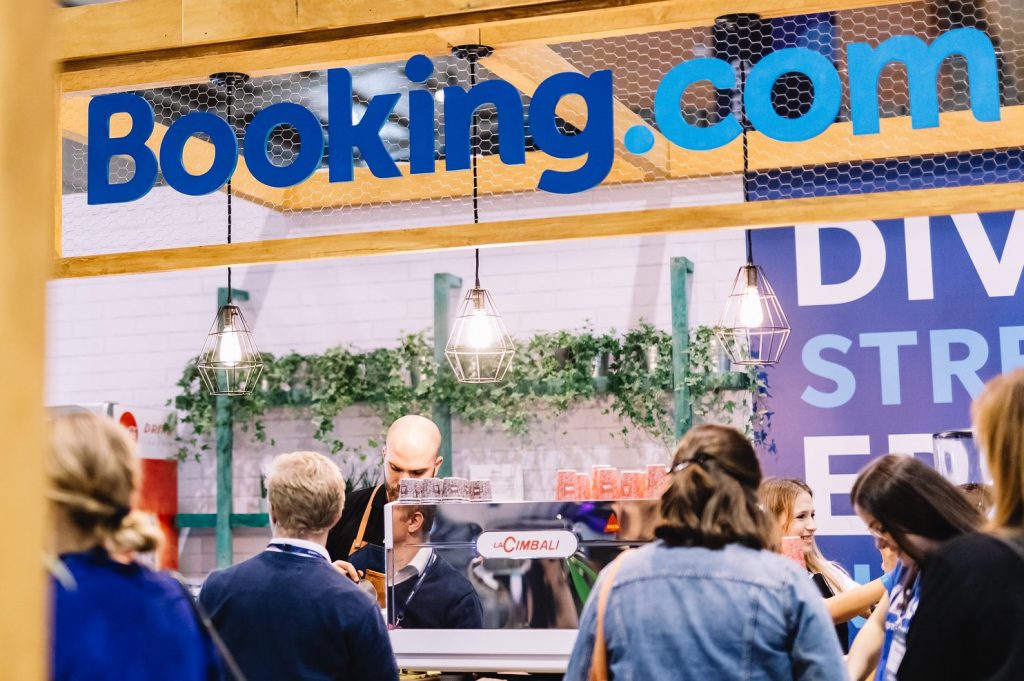Skift Take
Booking.com's Arjan Dijk gave a feisty interview at Skift Forum Europe, touching on his skepticism about Airbnb CEO Brian Chesky's bold predictions about the future of travel, the marketing strategies of his competitors, and whether aid programs for the industry make sense.
Skift Forum Europe is here and we're excited! We have a jam-packed agenda that includes keynote presentations, panels, and brand talks with an array of travel leaders as we explore the future of travel leading out of the pandemic.
You’re not alone. Even the top marketing boss of one of the world’s largest resellers of travel isn’t sure about his vacation plans. Like many travelers, Arjan Dijk, senior vice president and chief marketing officer at Booking.com, is still watching how the recovery from the coronavirus pandemic is unfolding.
“I’m thinking of my summer plans, and I’m probably going to Spain, but I’m still a little bit like, okay, hmm, I’m not completely sure,” said Dijk, when he gave a feisty interview for Skift Forum Europe on Tuesday.
Dijk said his teams only use marketing to help speed up growth in regions and demographic segments that are showing momentum toward buying travel.
Showing Skepticism
Dijk slammed Airbnb’s view that people will flock to vacation rentals rather than hotels as a safer bet during the pandemic, in response to a question from Dennis Schaal, executive editor at Skift.
Some recent data has suggested vacation rental bookings are strong relative to hotels, and Airbnb said its rental listing count has risen since before the pandemic, thanks in part to the travel reseller rolling out voluntary sanitization and coronavirus prevention programs for hosts.

Arjan Dijk, chief marketing officer of Booking.com, at the company’s Click event in fall 2019. Source: Booking Holdings.
“We’re not going to prescribe to our customers what they should do,” Dijk said, claiming Booking.com had the widest choice of both rentals and hotels.
But that said, as far as rentals being more popular than hotels, “I’m not buying it,” Dijk said. “It’s not what I believe is true.”
In April, Airbnb co-founder and CEO Brian Chesky said his company is already adapting to what he forecast would be a post-coronavirus era where mass tourism will be on the wane and “travel redistribution“will take hold, when speaking with Skift founder and CEO Rafat Ali.
But Dijk said he didn’t share Chesky’s view that travel will permanently change in the long-term.
“It makes a good headline,” Dijk said. “So I give Brian credit because good headlines matter.”
Tweaking Booking.com’s Marketing Strategy
Before joining Booking.com, Dijk led the overall strategy and operations for marketing worldwide at Google, which employed him for 11 years. Soon after Dijk joined Booking.com a year ago (as Skift first reported), he made some changes.
In recent years, Booking.com has rebalanced its mix to add more brand marketing, including TV ads, to attract more direct traffic, which officials have stated stands at more than half of all its visitors. That fundamental goal remains unchanged.
But Dijk has encouraged his teams to erase the mental distinction between brand marketing, such as thirty-second spots on broadcast TV, and search engine marketing.
In the interview, Dijk called the distinction “a bit old school.” Dijk argued that this description no longer reflects the sophisticated way different consumers with different behaviors interact with brands and respond to various types of marketing.
Dijk said he was skeptical about why some Booking.com competitors have been complaining about having to shift from search engine optimization spending, where they try to get organic (unpaid) traffic from Google search results, to search engine marketing, where they have to advertise in Google’s channels. (See Expedia CEO Details Anti-Google Game Plan for context.) Dijk said such talk was misleading at best.
“Why are our competitors suddenly talking about it?” Dijk asked rhetorically. “I think there are probably other reasons, like, their overall return on investment in their marketing budget overall is probably not at a level where they want it to be.”
Dijk said Booking.com is better at optimizing its spending, noting that about a third of his team are data scientists who study customer behavior data and ad inventory costs and use the intel to divide marketing dollars cost-effectively.
Dijk also took on rival travel brands for having recovery programs he thought weren’t substantive. Many online travel brands have created industry support funds, such as Expedia, Airbnb, Tripadvisor, and Trip.com Group, though not Booking.com so far.
“Of course we want a thriving industry, it’s in our best interest for our partners to be hugely successful,” Dijk said. “But what is the role we want to play. The big question marks around these aid programs are that they’re complex, unclear, and kind of PR programs to make companies look good. But is the aid really good for the partners?”
Dijk said Booking.com wanted to focus on bringing back demand quickly.
A Netherlands native, Dijk recently relocated from California to Amsterdam with his black labrador retriever Mickie. He said he was inspired in part by Booking.com’s vision of “the connected trip.”
Meanwhile, the question of who will emerge from the crisis strongest, Booking Holdings, Airbnb, Expedia, or Trip.com Group, will animate analysts for months.
The Daily Newsletter
Our daily coverage of the global travel industry. Written by editors and analysts from across Skift’s brands.
Have a confidential tip for Skift? Get in touch
Tags: booking holdings, booking.com, sfe2020, skift forum europe
Photo credit: The Booking.com logo at a recent Web Summit event. Web Summit / Flickr.com

